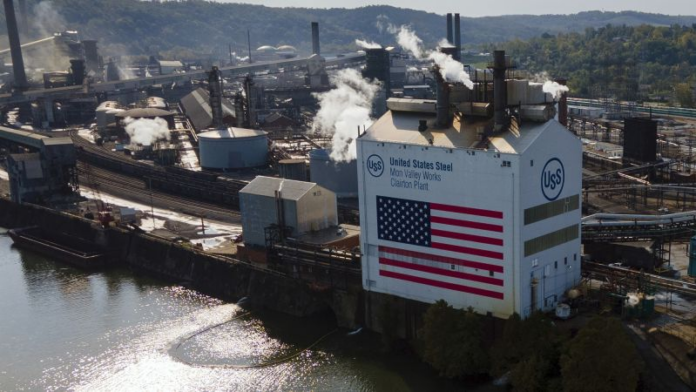New York CNN —
US Steel and Nippon, whose $14.3 billion merger was blocked by President Joe Biden last week, filed a lawsuit against the US government Monday, claiming Biden’s executive order to bar the companies from combining was signed for “purely political reasons.”
“Today’s legal actions demonstrate Nippon Steel’s and US Steel’s continued commitment to completing the transaction — despite political interference,” the companies said in a statement.
The suit is no surprise. The day Biden issued an order blocking the deal, the companies called the action “a clear violation of due process” and said they had “no choice but to take all appropriate action to protect our legal rights.”
Biden had spoken for months about his opposition to the deal. The companies’ statement said that Biden had “ignored the rule of law to gain favor with … (the United Steelworkers union) and support his political agenda.”
In addition to the suit seeking to throw out Biden’s order, the companies filed a separate suit against Lourenco Goncalves, CEO of rival steelmaker Cleveland-Cliffs and Dave McCall, president of the United Steelworkers union, for their actions to try to block the deal, which the suit charges are “anticompetitive and racketeering activities illegally designed to prevent any party other than Cliffs from acquiring US Steel as part of an illegal campaign to monopolize critical domestic steel markets.”
In addition to seeking to block Cliffs and the USW from acting together, that separate lawsuit seeks “substantial monetary damages for their conduct.”
The White House defended the decision to block the deal in a statement Monday.
“A committee of national security and trade experts determined this acquisition would create risk for American national security,” said spokeswoman Robyn Patterson. “President Biden will never hesitate to protect the security of this nation, its infrastructure, and the resilience of its supply chains.”
USW President McCall issued a statement again praising the action by Biden and denouncing the suit.
“We are reviewing the complaint and will vigorously defend against these baseless allegations,” he said.
Cleveland-Cliffs did not have an immediate response to the lawsuits.
The fight for US Steel
In August 2023, US Steel announced it had received multiple offers to buy the company and that it would weigh the offers. It confirmed that one of the offers was from Cleveland-Cliffs, which had already passed US Steel to become the second-largest American steelmaker behind mini-mill operator Nucor, but that those talks had broken down.
The Cleveland-Cliffs offer at that time was worth about $7.3 billion in cash and stock, or about half what Nippon would eventually offer when it reached the agreement to buy US Steel in December 2024. But as a unionized steelmaker, Cleveland-Cliffs had the support of the USW in its bid.
Last summer, US Steel announced that without the investment in its older, union-represented mills promised by Nippon Steel as part of the deal, it might be forced to close the mills. In response, Cleveland-Cliffs said it would be willing to buy those mills.
The opposition to Nippon Steel buying US Steel has been bipartisan, with Vice President-elect JD Vance an early opponent of the deal. President-elect Donald Trump has also vowed to block the deal if it was still alive once he takes office later this month.
The proposed purchase was bound to be unpopular. US Steel was once a symbol of American industrial might. It was the most valuable company in the world and the first to be worth $1 billion soon after its creation in 1901. It was also crucial to the US economy and the cars, appliances, bridges and skyscrapers that tangibly indicated that strength.
But it has suffered through decades of decline since its post-World War II height. It is no longer the largest US steelmaker, and it’s a relatively minor employer, with 14,000 US employees — 11,000 of whom are USW members. But it is still not a company that politicians who enjoy talking about American greatness want to see fall into foreign hands — particularly in the politically significant state of Pennsylvania.
While it doesn’t employ nearly as many people as it used to, US Steel reports that it has nearly 18,000 retirees and beneficiaries drawing benefits from its pension funds. And there are hundreds of thousands whose parents, grandparents or even great-grandparents worked at US Steel at one point.
Implications for blocking the deal
But there are those who are concerned that the action could scare away needed foreign investment in other US industries, and that it might end up hurting the future competitiveness of US Steel.
At his New Year’s press conference on Monday, Japanese Prime Minister Shigeru Ishiba called on the US to “take strong measures to address concerns” regarding Nippon Steel’s plan to acquire US Steel.
“If there are security concerns, they must be clearly explained. Without such clarity, discussions cannot proceed,” he said, while also noting growing concerns within Japan’s industrial sector about the impact of Biden’s decision on future investment relations.
Late last month, the Committee for Foreign Investment in the United States, known colloquially as CFIUS, notified Biden that it had not reached a consensus about whether or not US Steel’s sale to Nippon would pose a national security risk, leaving the decision up to the president to determine whether or not to block the deal on national security grounds.
“The President’s decision was based on illegitimate and self-serving political considerations – a clear violation of the entire CFIUS process, which was created as an apolitical safeguard to protect national security,” said Nippon and US Steel in the suit against the federal government’s action.
Even within the Biden administration, there was opposition within the Biden administration as to whether or not block the deal, despite Biden’s stated opposition.
“Bad decision,” one senior administration official told CNN of Biden’s then forthcoming move to block the deal. “Doesn’t actually protect union jobs and may kill the company.”
The USW has strongly opposed the deal since the moment it was announced, arguing that Nippon has not given it sufficient guarantees that it would protect unionized jobs at some of the company’s older mills staffed by union members.
The union said Friday that the company can continue to profitably operate those older mills without Nippon’s investment.
“We’re confident that with responsible management, US Steel will continue to support good jobs, healthy communities and robust national and economic security well into the future,” said the union in a statement on Friday.
Nippon said it does not intend to close the integrated mills that US Steel has in Pennsylvania and Indiana, which makes steel from raw material such as iron ore. And it says it will honor all labor contracts with the USW in addition to making the investment in plants where the union’s members work.
But the USW insists that Nippon’s plans would endanger those unionized jobs. It said Nippon intends to ultimately transfer production from integrated, union-represented mills in Pennsylvania and Indiana to US Steel’s own mini-mill operation in Texas, where new steel is made by melting steel scrap.
This story has been updated with additional reporting and context.
US Steel and Nippon sue Biden administration, Steelworkers union and Cleveland-Cliffs over their blocked merger
RELATED ARTICLES



